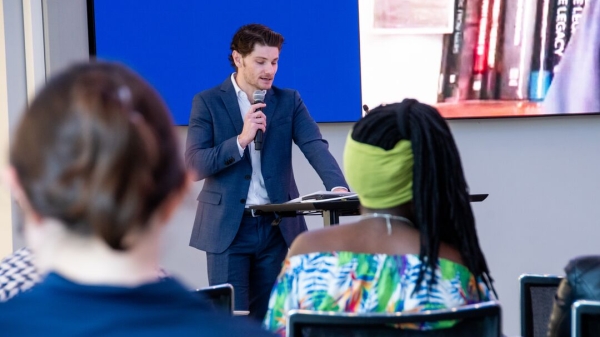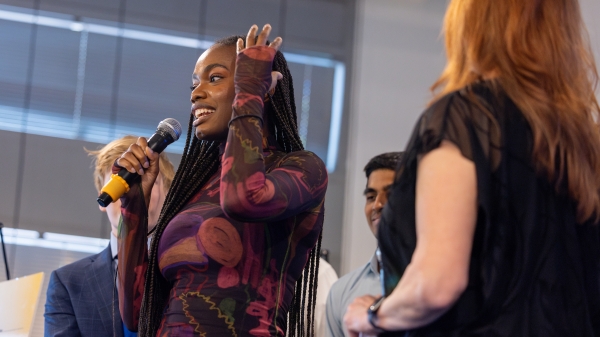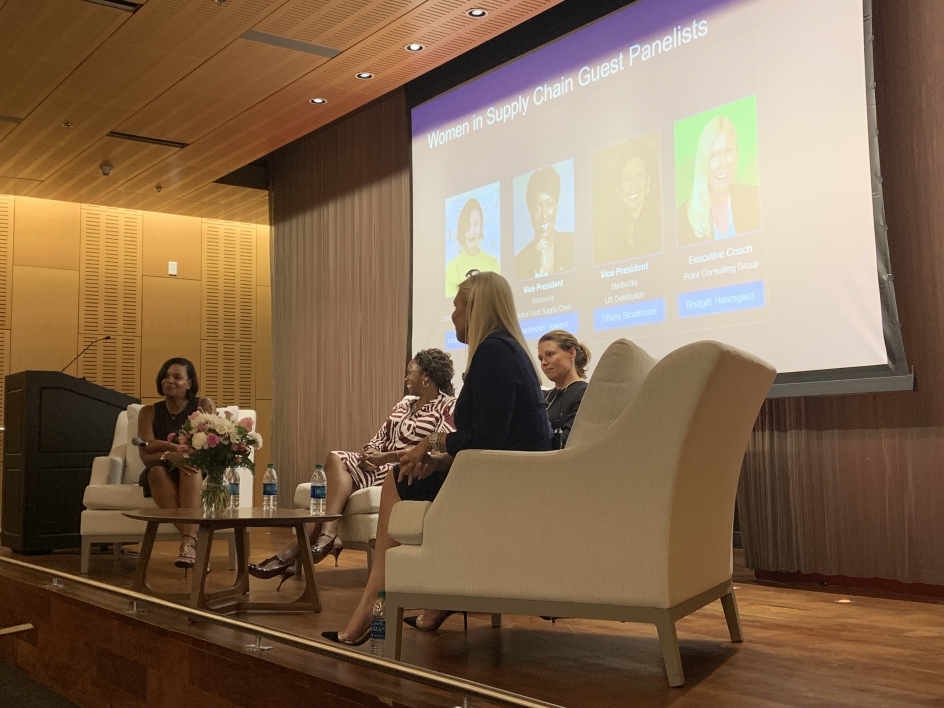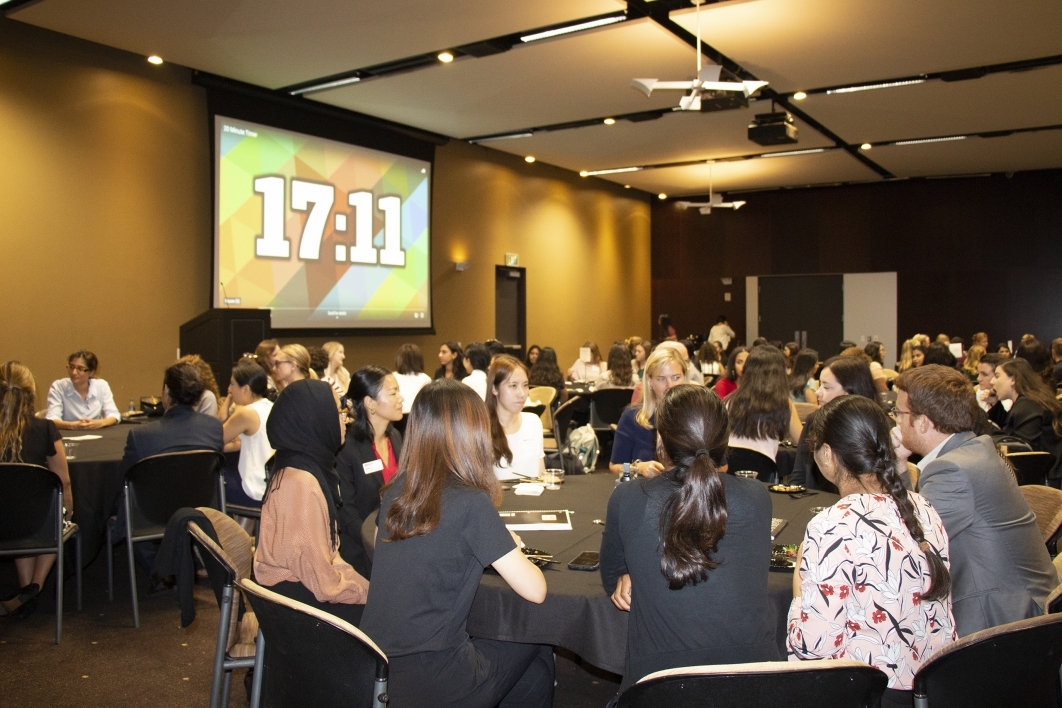What does the future hold for women in supply chain management?
That was the question answered by the ASU Supply Chain Executive Consortium and the W. P. Carey School of Business, with help from some dynamic female executives, at the Arizona State University Women in Supply Chain event on Wednesday, Aug. 28, where more than 100 attendees — 64% of whom were supply chain students — discovered insights to help them prepare for their career, learned more about key companies in the supply chain and unlocked their leadership potential.
W. P. Carey Lecturer Cindie Blackmer emceed the event, and Associate Dean of Undergraduate Students Michele Pfund kicked it off, opening with a few lessons about being a woman in the supply chain industry.
“I learned to love sports,” said Pfund. “By knowing sports, I could join other conversations. I also learned to trust my male colleagues.”
She also shared how her first boss told her that it’s OK to fail.
“Find the small wins in the failures,” Pfund said, and then invited the first speaker to the stage.
Here are more event highlights:
The hub of activity
Linsey Rosenlund, director of supply chain operations at Cisco, earned her bachelor's degree in supply chain management from ASU in 2000 and recently celebrated her 16th year at the computer networking company. She regularly visits campus to recruit.
“The curriculum is enticing to companies,” she said. After a lot of research to choose the right undergraduate degree, Rosenlund chose supply chain management because her fellow Alpha Kappa Psi members told her about the practical applications it offers.
“Supply chain touches everything — from connecting people and bringing together optimization to creating the differentiator for your company,” Rosenlund said, adding that supply chain management is the hub of activity. “We work with everyone. Sometimes we see things they don’t, so we add a lot of value.”
Rosenlund, who has been in supply chain management her entire career, said she’s passionate about product development and partner management. At Cisco, Rosenlund manages all inbound material from factories, including headsets and phones for individual users to high-end routers.
“I love what I do every day,” Rosenlund said. “It’s challenging because we have to navigate the best possible outcomes to please the masses, and there are complex problems to solve around trade, tariffs and gas prices.”
Messages for men, too
It was appropriate for Rosenlund to bring up the next speaker Nichol Luoma, who also earned her bachelor's degree in supply chain management from ASU in 2000, as the two chose the major together and were study buddies during school.
Luoma graduated summa cum laude from Barrett, The Honors College, and was also a W. P. Carey Outstanding Graduating Senior. Like Rosenlund, Luoma has spent her career in supply chain. However, she got her supply chain experience at several well-known companies, including Southwest Airlines, Intel, Clarkston Consulting, Keen Distribution and Boon before landing her longest-tenured supply chain role as director of procurement and the first chief procurement officer at ASU. Since beginning this role in 2012, she’s added more to her title. Today, Luoma also serves as the vice president of University Business Services and as a sustainability officer.
“Interning at Intel changed my life,” Luoma told the audience. “It has a specific culture; it’s an interesting place to work. Most importantly, it framed my early thoughts on being the only woman in the room.”
As the director of procurement, one of Luoma’s most significant tasks was reorganizing the department that provides products and services to the faculty, students, and staff of ASU. Now as vice president of University Business Services, she's also working on making sure there are programs and work-life policies that are supportive of moms.
While the audience poll calculated 84% women in the auditorium, Luoma said, “We are not separate. Men need to hear these messages, too.”
Luoma’s final advice for the attendees: Network, connect with people and ask hard questions. She also stressed the importance of supporting women in the workplace, whether that means appreciating their decision to stay home with kids or repeating their ideas in meetings, as well as giving back as a leader.
Finding your passion
Kelly Bengston, senior vice president and chief procurement officer for global sourcing at Starbucks, admitted she didn’t know much about supply chain management when she got her undergraduate degree in business management. Because her father was a restaurant owner, however, perhaps she was unknowingly influenced by the supply chain industry.
Bengston was only 22 when she worked in a distribution center, buying women’s hosiery for Macy’s.
“At the time, I was trying to find a balance between being a working professional and wife,” she said.
It wasn’t until she worked for Cranium (acquired by Hasbro) that she fell in love with supply chain management. At the 40-person company that employed five women, she mastered the complex world of the Asian supply chain and drove cost savings, timeline acceleration, vendor sourcing and creative solutions.
Bengston hit a crossroads when Hasbro relocated and gave her the choice to move her family to Rhode Island. Supported by her husband’s job as an engineer, she chose to stay on the West Coast with their 3-year-old, close to parents and in-laws, and look for a new job.
“My old employer called to offer me a job building accessories for iPhone 3 while I was in the interview process with Starbucks,” Bengston said. She turned Starbucks down, but that only lasted eight months. Bengston took a lower position at Starbucks in 2010 and has since moved up six times.
“Starbucks allowed me to balance innovation, operational excellence, family and impact people,” Bengston said. “Every day I have the opportunity to encourage other women with diverse backgrounds. It’s important to find the right company and passion that fuels you from inside out.”
Starbucks offers 100% pay equity for men and women, and part-time hours with full benefits.
“One of the key messages that I want to share with men, too, is to find what makes you happy outside of the workplace and stay true to what that is,” Bengston said before sharing her favorite quote from Amelia Earhart:
“The most difficult thing is the decision to act, the rest is merely tenacity.”
Women in supply chain guest panel
After the presentations, women leaders gathered on stage to explore some of the challenges faced in the supply chain management industry, discussing how to bring about change and answering questions from the audience.
The panelists included executive coach at Point Consulting Group Bridgitt Haarsgaard, vice president of Starbucks U.S. distribution Tiffany Broderson, vice president of Starbucks global food supply chain Jacquelyn Howard and head of supply chain inclusion talent strategy at Cisco Modupe Congleton, who moderated the conversation.
On being real
An audience member asked how to deal with imposter syndrome and balance professionalism while being authentic. Haarsgaard chimed in, “At any organization, you work for — Starbucks, Cisco, Goldman Sachs — there are different cultures and unique rules of engagement, such as email response policies,” she said. “Understand the rules, and within them, you can use your voice.”
Howard added that it’s OK to “open yourself up as a real person who has challenges and joyful times. These things matter to me, so I want to be able to talk about my sick baby, a mental break. I want people to know it’s OK to be a whole person, not just, ‘How are you,’ ‘I’m OK.’ It’s about having people who appreciate and endorse you.”
Congleton confessed that she used to wear flats and blue suits to fit in at conferences. “Maybe I need to conform so people see me intellectually,” she said. “This made me feel insecure because I wasn’t being my authentic self.”
Haarsgaard said not to be afraid to own who you are — mom, worker, spouse. “If you have a daughter, it’s in your power to talk about her and take time off work for parenting responsibilities. She urged any working women who are mothers not to feel bad or guilty for their parental responsibilities but to applaud themselves for juggling work and family.
On the pre- and post-meeting meeting
Howard highly suggested knowing the pulse of an organization. “Before a meeting, make sure your approach makes sense, that your piece works into the plans for the department by collaborating with peers before the meeting,” she said. “It’s the best way to get people on board your strategy. After the meeting, get feedback from your colleagues. How did that go? What would you do differently?”
On advocating for yourself
Broderson shared that in an interview for a promotion, a concern that came up was that she was perceived as too nice. “I got my finger out, pointed, and said, ‘Just because I’m nice, doesn’t mean I can’t make tough decisions,’” she said. “The lesson: People can have perceptions of you that aren’t voiced. State your strengths.”
Haarsgaard added, “Sponsors are people who talk positively about you when you’re not in the room. You get them by doing a good job.”
Howard said to look outside the obvious places for advocacy or support.
Congleton said it’s not bad to advocate for yourself by understanding the company benefits. If you run into a scenario where the boss doesn’t understand your parental leave rights, ask yourself if that’s someone who isn’t supportive of you as a human being. “You can have it all, but you can’t have all the time in the world. It’s your responsibility to juggle and advocate for yourself,” she said.
On LinkedIn, “Let people know what you want,” said Howard. “I’m seeking a supply chain opportunity” is an example of a profile headline.
On boundaries
“I don’t want people to feel like they have to burn the midnight oil,” Howard said. “Whatever my day looks like, I don’t let it affect my team. If I get up super early, I won’t send emails to them super early.”
Set expectations for people to follow. “Teach people how to treat you by standing your ground and voicing your expectations,” advised Haarsgaard. “If the policy is no emails between 5 and 9, follow it, too.”
On being positive
There will always be haters, but Congleton said to surround yourself with positive people — and play Beyoncé.
“Switch the narrative to, ‘I’m fabulous. I have a great education and so many gifts to offer,’” said Haarsgaard. “If you put out positive energy, that’s what you’ll get in return.
“When you’re feeling negative, watch your language,” Haarsgaard continued. “Let’s say you get a flat tire and you’re late to a meeting." Instead of apologizing profusely, she recommended thanking the team for waiting. “Thank you for allowing me the extra 30 minutes,” she said is a good line. “Make it about gratitude.” She also suggested ousting negative energy by getting up, playing music, taking a walk, playing with the dog — just do something different.
Vice president of global operations for Dell Christy Abizaid closed the panel conversation. “I was the only woman in the room a lot,” said Abizaid, who spent most of her career on counterterrorism issues for the U.S. government. “That was OK. You deal with people the way you expect them to deal with you.”
Because Abizaid switched industries, she talked about how to navigate transitions. “Uncertainty is natural, but it’s a temporary state. You’ll get over it.”
As a staff member on the National Security Council as both a director for counterterrorism and senior policy adviser to the assistant to the president for homeland security and counterterrorism before joining Dell, it’s not surprising Abizaid shared her favorite quote by Condoleezza Rice: “Being open to unexpected turns in the road is an important part of success. If you try to plan every step, you may miss those wonderful twists and turns.”
Abizaid closed with intelligence on negotiating a compromise. “Find the happy middle ground, and take every situation for its uniqueness,” she said. “Understand who you’re dealing with and what they care about. Find a way to maneuver the conversation so you get what you want, and know what you’re willing to give up to serve the greater good.”
Executive speed networking roundtables
After hearing the speakers, attendees joined them for enlightening discussions around table-specific themes, including gender bias, sponsorship/advocacy, pay parity, negotiating worth, women uplifting women, diversity and inclusion, words of women and being the only woman in male-dominated teams. Each table was open to ASU and W. P. Carey students and included one executive who led the discussion. After 20 minutes, attendees had the opportunity to rotate to another table, with three rotations in all.
The supply chain program in the W. P. Carey School of Business was ranked second for the second consecutive year by U.S. News and World Report. Learn more about supply chain management degrees.
More Business and entrepreneurship

California roots, global impact: Thunderbird at ASU grad's journey in global management
Editor's note: This story is part of a series of profiles of notable spring 2024 graduates. Lake Forest, California, native…

ASU student entrepreneurs win cash investments for ventures at Demo Day
Several Arizona State University student entrepreneurs who won big cash investments for their ventures on Saturday expressed…

Hispanic Business Students Association marks half a century of impact, growth
When Michelle Macias, a native of Yuma, Arizona, became a business entrepreneurship and management student at Arizona State…


